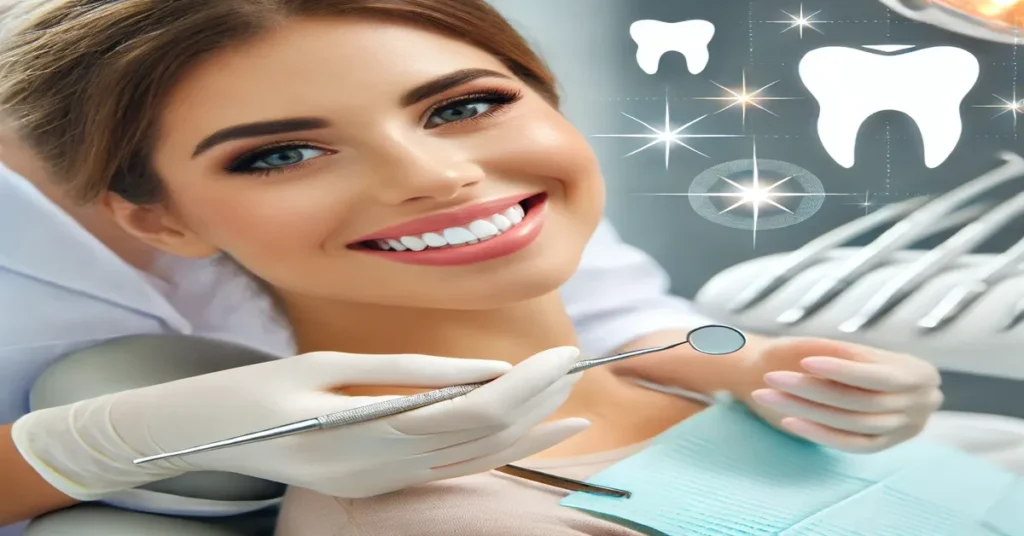Dental cleaning is a crucial aspect of maintaining good oral hygiene and overall health. Regular professional cleanings not only help you achieve a bright smile but also prevent a range of dental issues, including cavities, gum disease, and bad breath. If you’re searching for “dental cleaning near me,” you’re taking an essential step toward preserving your oral health. This article will provide a detailed guide to dental cleaning, its benefits, the process, costs, and tips for finding the best dental cleaning services near you.
What is Dental Cleaning?
Dental cleaning, also known as prophylaxis, is a preventive procedure performed by a dentist or dental hygienist to remove plaque, tartar, and stains from your teeth. While daily brushing and flossing are essential, professional cleanings address areas that are hard to reach with regular oral care routines.
Dental cleanings play a vital role in preventing oral health problems such as:
- Gum disease (gingivitis and periodontitis)
- Tooth decay
- Staining and discoloration
- Bad breath (halitosis)
Benefits of Regular Dental Cleaning
Regular dental cleanings offer numerous benefits beyond achieving a sparkling smile. Here’s a closer look at why this procedure is essential:
- Prevents Cavities and Tooth Decay
Plaque, a sticky film of bacteria, is the primary cause of tooth decay. Regular dental cleanings remove plaque buildup, reducing the risk of cavities. - Reduces the Risk of Gum Disease
Tartar buildup along the gum line can lead to inflammation and gum disease. Professional cleanings help keep your gums healthy and free from infection. - Improves Overall Health
Poor oral health is linked to systemic conditions such as heart disease, diabetes, and respiratory infections. Regular cleanings contribute to better overall health by minimizing oral bacteria. - Brightens Your Smile
Dental cleaning removes surface stains caused by coffee, tea, tobacco, and other factors, leaving you with a whiter, more polished smile. - Prevents Bad Breath
Persistent bad breath is often caused by plaque and tartar buildup. Cleanings eliminate these culprits, keeping your breath fresh. - Detects Early Signs of Oral Issues
During a dental cleaning, your dentist or hygienist can identify early signs of cavities, gum disease, or other oral health problems, allowing for prompt treatment.
What Happens During a Dental Cleaning Appointment?
If you’ve never had a dental cleaning or are curious about the process, here’s what you can expect:
1. Initial Examination
- The dentist or hygienist begins by examining your mouth for any signs of issues such as gum disease, cavities, or oral infections.
- X-rays may be taken if needed to assess areas not visible to the naked eye.
2. Scaling
- This step involves removing plaque and tartar from the surface of your teeth and along the gum line using specialized tools.
- Ultrasonic scalers may be used for more efficient tartar removal.
3. Polishing
- After scaling, your teeth are polished with a gritty toothpaste-like material to remove surface stains and smooth the enamel.
- A high-powered electric brush is typically used for this step.
4. Flossing
- The hygienist will floss between your teeth to remove any remaining debris and ensure your gums are healthy.
5. Rinsing
- A fluoride rinse or antiseptic mouthwash is used to remove loosened plaque and debris from your mouth.
6. Fluoride Treatment (Optional)
- Some cleanings end with a fluoride treatment, which strengthens your enamel and provides extra protection against cavities.
How Often Should You Get a Dental Cleaning?
Most dental professionals recommend scheduling a cleaning every six months. However, the frequency may vary based on your oral health condition:
- Every 6 Months: Recommended for most individuals with healthy gums and no significant dental issues.
- Every 3-4 Months: Advised for individuals with a history of gum disease or a tendency for tartar buildup.
- Annually: Suitable for individuals with excellent oral hygiene and no significant risk factors.
How to Find the Best Dental Cleaning Near Me
Finding a reputable dental cleaning service near you involves a bit of research and consideration. Here are some tips:
1. Search Online
Use search engines or online directories to find dental clinics in your area. Look for keywords like “dental cleaning near me” or “dentist near me.”
2. Check Reviews and Ratings
- Read patient reviews on Google, Yelp, or other platforms to assess the clinic’s reputation.
- Look for comments about cleanliness, professionalism, and the quality of care.
3. Ask for Recommendations
- Seek referrals from friends, family, or colleagues who have had positive experiences with local dentists.
- Recommendations often provide reliable insights into the quality of services.
4. Verify Credentials
- Ensure the dentist and staff are licensed and qualified to perform dental cleanings.
- Look for certifications or memberships in professional organizations like the American Dental Association (ADA).
5. Visit the Clinic
- Schedule a consultation to assess the clinic’s environment, cleanliness, and staff demeanor.
- Discuss your concerns and ask questions about their dental cleaning procedure.
6. Consider Insurance and Costs
- Confirm whether the clinic accepts your dental insurance.
- Inquire about the cost of a cleaning if you’re paying out-of-pocket.
How Much Does Dental Cleaning Cost?
The cost of dental cleaning varies depending on factors such as location, the clinic’s reputation, and the complexity of the procedure. Here’s an approximate breakdown:
- Routine Cleaning: $75 – $200
- Covers standard scaling, polishing, and flossing.
- Deep Cleaning (Scaling and Root Planing): $150 – $300 per quadrant
- Required for individuals with gum disease or significant tartar buildup.
- Pediatric Dental Cleaning: $50 – $100
- Designed for children with smaller teeth and less plaque accumulation.
- Add-Ons:
- Fluoride treatment: $20 – $50
- X-rays: $25 – $150
Many dental insurance plans cover routine cleanings at no additional cost, so check with your provider for details.
Tips for Maintaining Oral Health Between Cleanings
While professional cleanings are essential, maintaining oral hygiene at home is equally important. Here are some tips:
- Brush Twice a Day
- Use a fluoride toothpaste and a soft-bristled toothbrush.
- Brush for at least two minutes to ensure thorough cleaning.
- Floss Daily
- Flossing removes food particles and plaque from between your teeth where brushes can’t reach.
- Use Mouthwash
- Antiseptic mouthwash helps reduce bacteria and freshens breath.
- Stay Hydrated
- Drink plenty of water to wash away food particles and stimulate saliva production.
- Limit Sugary and Acidic Foods
- Reduce your intake of candies, sodas, and acidic beverages to prevent tooth decay.
- Don’t Skip Dental Visits
- Attend regular check-ups and cleanings to keep your oral health in check.
Common Concerns About Dental Cleaning
1. Does Dental Cleaning Hurt?
- Routine cleanings are typically painless, though you may feel slight discomfort if you have sensitive teeth or gums.
- Deep cleanings may require local anesthesia for comfort.
2. Can Dental Cleaning Damage Enamel?
- Professional cleanings are safe and do not damage enamel when performed by a trained hygienist.
3. How Long Does a Dental Cleaning Take?
- Most cleanings take 30-60 minutes, depending on the extent of plaque and tartar buildup.
4. Is Dental Cleaning Safe During Pregnancy?
- Yes, dental cleanings are safe and highly recommended during pregnancy to prevent gum disease.
Conclusion
Regular dental cleanings are an essential part of maintaining your oral health and achieving a bright, confident smile. By understanding the process, benefits, and costs, you can make informed decisions about your dental care. Searching for “dental cleaning near me” is the first step toward a healthier mouth and overall well-being. Remember to choose a reputable dental clinic, maintain a consistent oral hygiene routine, and never skip your scheduled cleanings.
FAQs
1. How often should I schedule a dental cleaning?
Most people should have a cleaning every six months, but individuals with specific conditions may need more frequent visits.
2. Can dental cleaning remove stains from coffee and tobacco?
Yes, professional cleaning can remove surface stains caused by coffee, tea, tobacco, and other substances.
3. What’s the difference between a routine cleaning and a deep cleaning?
Routine cleaning addresses plaque and tartar on the tooth surface, while deep cleaning targets buildup below the gum line to treat gum disease.
4. Is dental cleaning covered by insurance?
Many dental insurance plans cover routine cleanings at no cost. Check your plan for specific coverage details.
5. Can children get dental cleanings?
Yes, children should have regular cleanings starting from their first dental visit, typically around their first birthday.
6. How do I find affordable dental cleaning services near me?
Look for clinics that accept your insurance, offer payment plans, or provide discounts for new patients. Local dental schools may also offer reduced-cost services.







